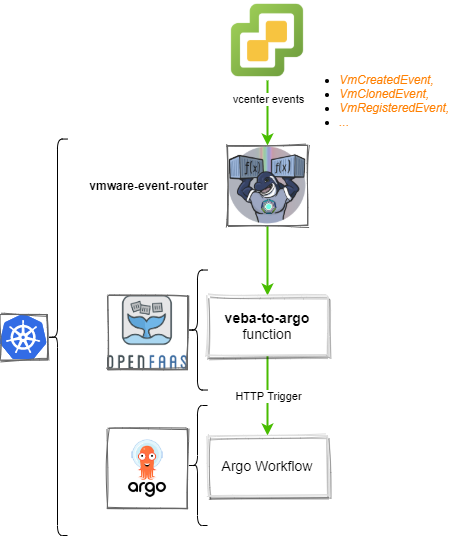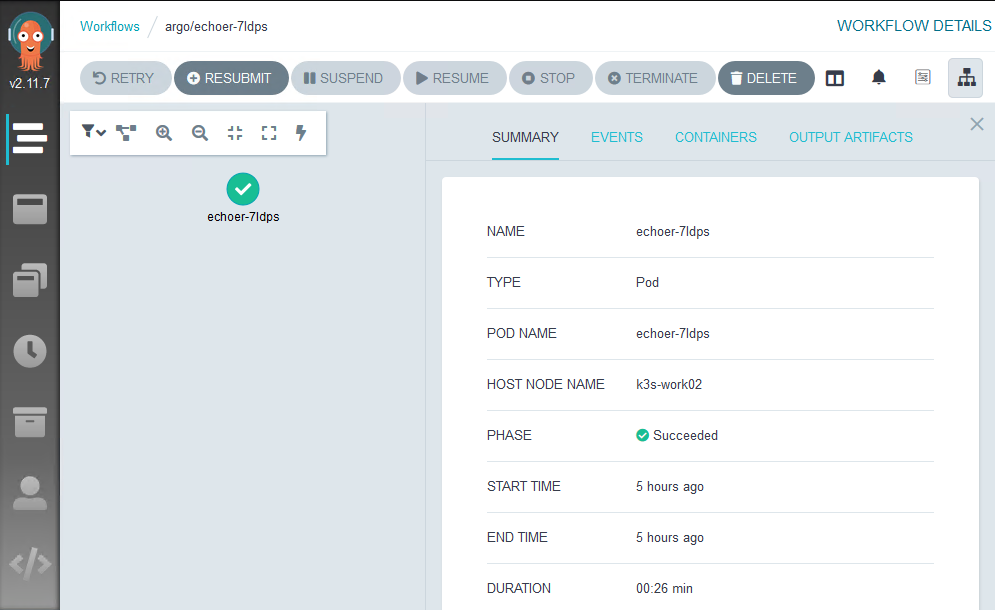Run Argo workflow from a VEBA event through OpenFaaS
I recently made posts about the VMware Event Broker (aka VEBA) to explain basic on-boarding in the FaaS and Event-Driven worlds.
As you may have noticed, the FaaS concept is perfect for use-case where the automation will be:
- Stateless
- Fast running
- No latency sensitive
- Responsible of a single thing
- Deterministic
BTW, there is a nice list of FaaS Best Practices on the VEBA documentation: Writing your own functions.
When you need to break one (or more) of the above rules, it may be necessary to rely on other kinds of automation, like Workflows.
In the following post, I will demonstrate how it is possible to forward VEBA events to a very powerful Workflow engine named Argo to run, for example:
- long-running automation
- multi steps automation
- stateful functions
- retry-able functions
This work relies on an OpenFaaS function: veba-to-argo-fn.
How does it works
This OpenFaaS function is a simple forwarder (or proxy) to execute a pre-definied Worklow Template by providing the incoming cloud-event as an input parameter of the Workflow excecution.

VEBA to Argo
Pre-requisites
You need:
- A deployed VEBA instance (appliance based or K8S based): How-to on vUptime blog
- A deployed OpenFaaS instance (+
faas-cli) - A deployed Argo instance (+
argocli): Quick Start
A clone of the below repository:
1git clone https://github.com/lrivallain/openfaas-fn.git
2cd openfaas-fn/veba-to-argo-fn
Deploy the Argo echoer template WF
1argo template create echoer-argowf.yaml
2argo template list
3
4# Expected output
5NAME
6echoer
This
echoerworkflow template is a very simple workflow that just repeats the incoming data in its stdin (logs).
Configure the function
Argo config secret
Copy and customize the argoconfig.example.yaml file:
1cp argoconfig.example.yaml argoconfig.yaml
1argoserver:
2 server: argo.vlab.lcl
3 protocol: http
4 namespace: argo
5 serviceaccount: argo-svc
6 template: echoer
7 event_param_name: message
8 labels:
9 through: openfaas
10 coming-from: veba
11 foo: bar
Deploy this configuration file as a new faas secret.
1faas-cli secret create argoconfig --from-file=argoconfig.yaml
2faas-cli secret list
3
4# Expected output
5NAME
6argoconfig
stack.yaml
Edit the stack.yaml according to your needs:
1version: 1.0
2provider:
3 name: openfaas
4 gateway: http://openfaas.vlab.local
5functions:
6 veba-to-argo-echoer:
7 lang: python3
8 handler: ./handler
9 image: lrivallain/veba-to-argo
10 environment:
11 write_debug: true
12 read_debug: true
13 secrets:
14 - argoconfig
15 annotations:
16 topic: VmCreatedEvent, VmClonedEvent, VmRegisteredEvent, DrsVmPoweredOnEvent, VmPoweredOnEvent
Now we need to pull the OpenFaaS language template for the specified lang in our stack.yml file:
1faas template store pull python3
Deploy the function
1faas-cli deploy -f stack.yaml
2faas-cli list
3
4# Expected output
5Function Invocations Replicas
6veba-to-argo-echoer 0 1
Test
You can also check the function from the UI and do a first test by running:
1echo '{"id": "test", "source": "sourcetest", "subject": "any", "data": {}}' \
2 | faas-cli invoke veba-to-argo-echoer
This should produce an excecution of a Worklow based on the echoer template in Argo.
Results
1argo get @latest
2
3# Expected output
4
5Name: echoer-7ldps
6Namespace: argo
7ServiceAccount: argo-svc
8Status: Succeeded
9Conditions:
10 Completed True
11Created: Wed Jan 06 09:56:19 +0000 (44 seconds from now)
12Started: Wed Jan 06 09:56:19 +0000 (44 seconds from now)
13Finished: Wed Jan 06 09:56:22 +0000 (47 seconds from now)
14Duration: 3 seconds
15ResourcesDuration: 1s*(100Mi memory),1s*(1 cpu)
16Parameters:
17 message: {"id": "test", "source": "sourcetest", "subject": "any", "data": {}}
18
19STEP TEMPLATE PODNAME DURATION MESSAGE
20 ✔ echoer-7ldps echoer/echo echoer-7ldps 26s
And in the logs:
1argo logs @latest
2
3# Expected output
4echoer-7ldps: {"id": "test", "source": "sourcetest", "subject": "any", "data": {}}
UI
Argo provide an UI to have a quick-view on the content status.
Here is the view of an echoer instance:

echoer instance in the UI
and a view of the printed logs:

echoer instance in the UI
Retries
If needed, you can re-run an existing instance of a workflow (with the same inputs) with the following kind of command:
1argo resubmit @latest --watch
VEBA event
In the same way, if you trigger on of the vCenter events configured in your stack.yaml file (like VmCreatedEvent, VmClonedEvent, VmRegisteredEvent, DrsVmPoweredOnEvent, VmPoweredOnEvent in the provided example) from you vCenter server:
- VEBA event router will trigger the OpenFaaS function with event as an incoming data
- OpenFaaS function will trigger the Argo worklow with the event as an incoming data
With the echoer workflow, you will be able to get the content of the event sent by VEBA and of course, you can now run a (more or less complex) workflow(s) catching the event data and making multiple actions.
Conclusion
The above example is just a very simple sample of the enabled capabilities and it was difficult to demonstrate in this blog post the behavior of the full setup without being too complex for readers.
But I strongly encourage you to test it by yourself and to provide me a feedback.
You can also fill a GitHub issue on the project if needed: New issue.